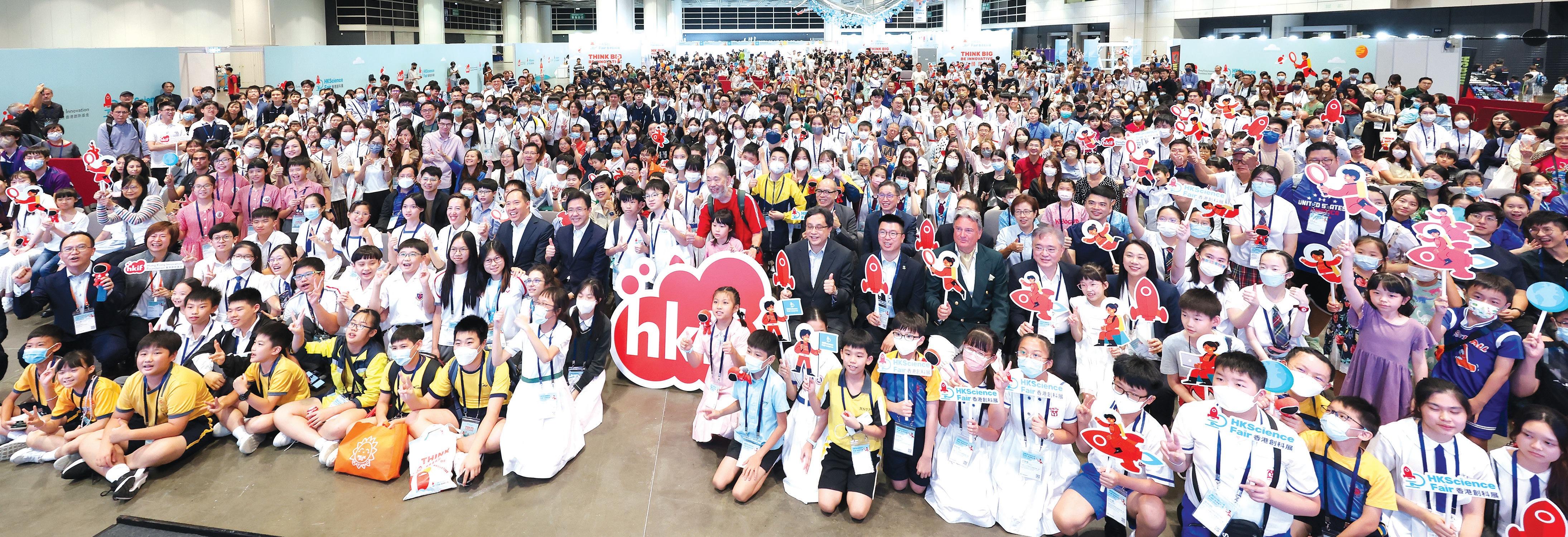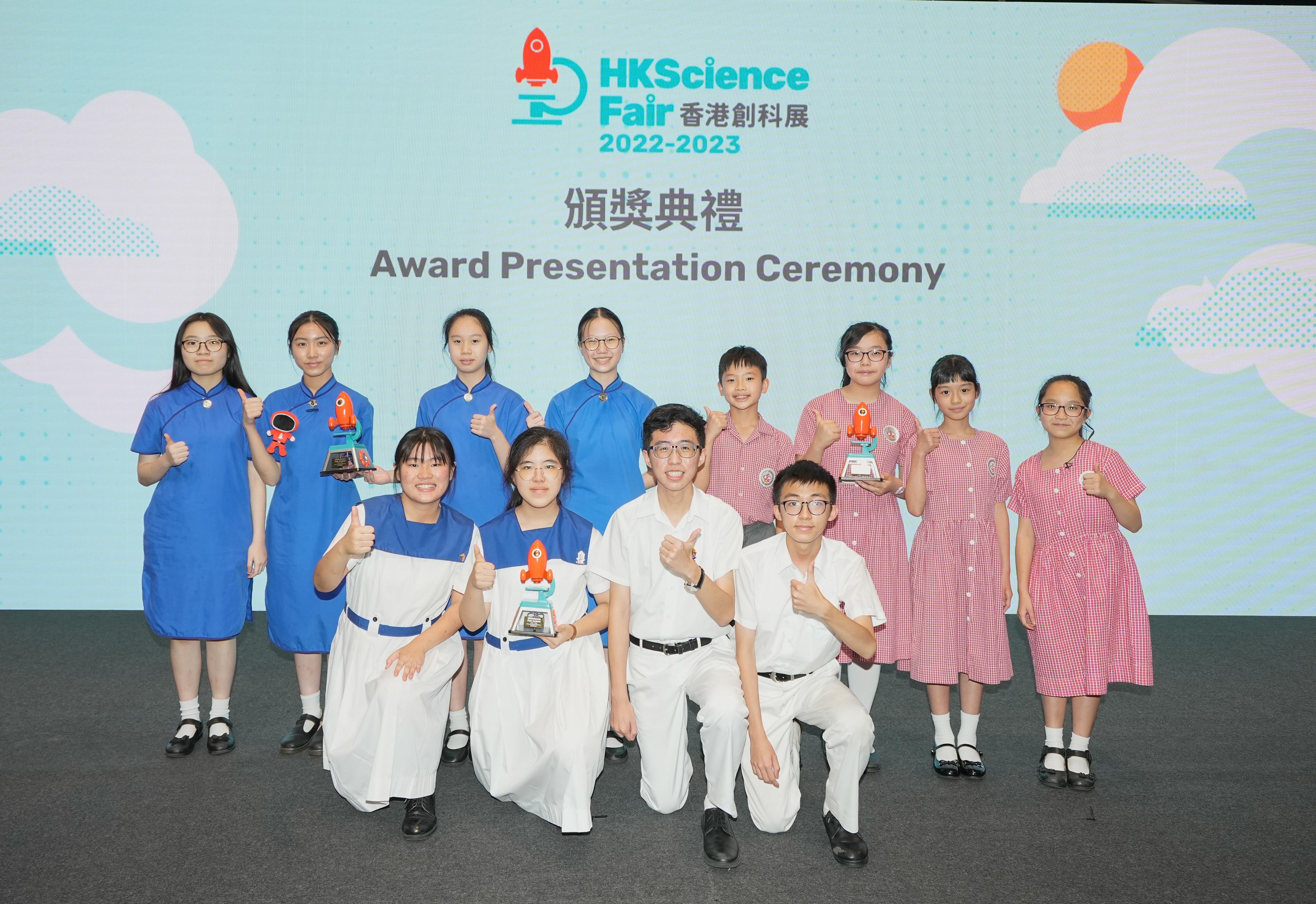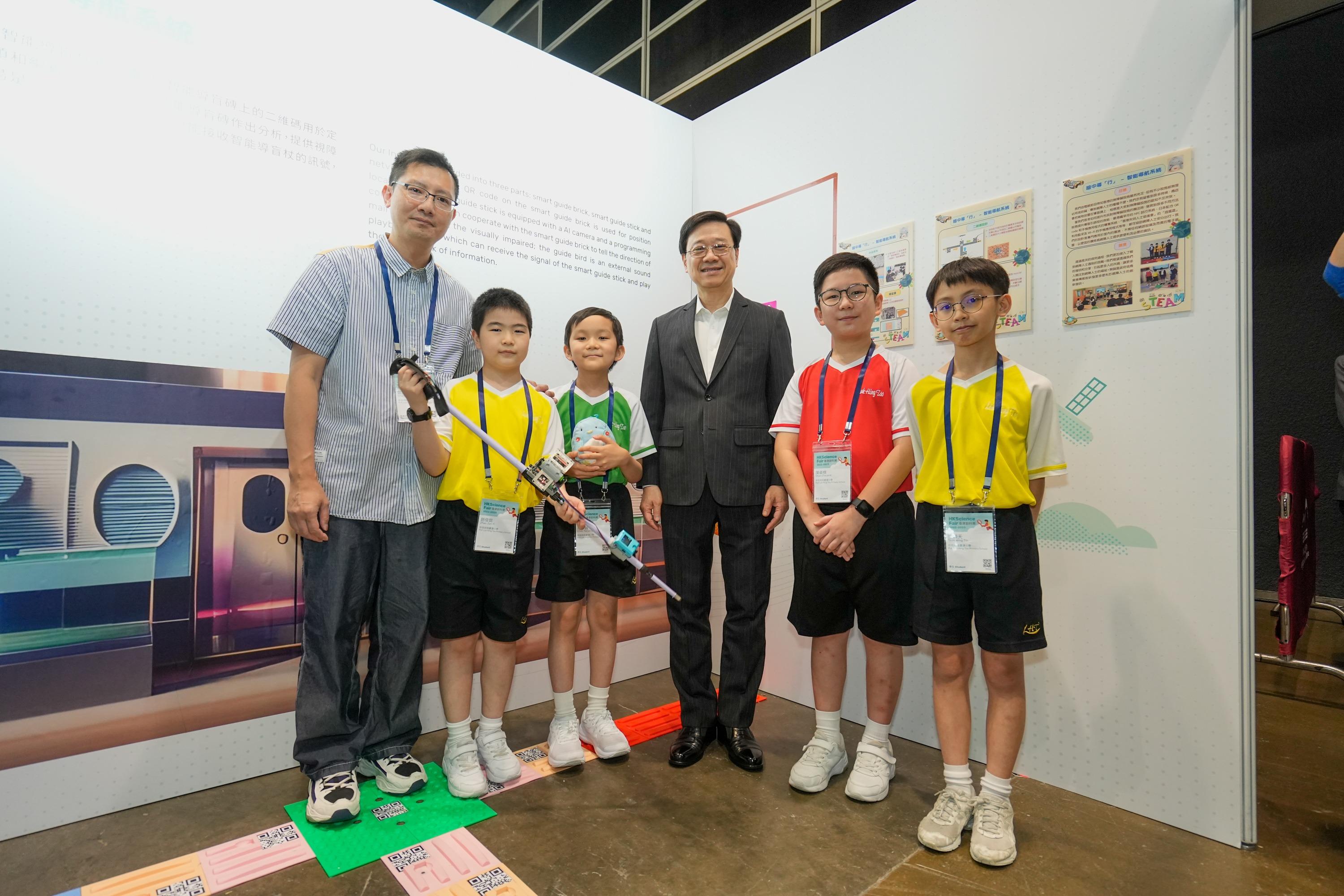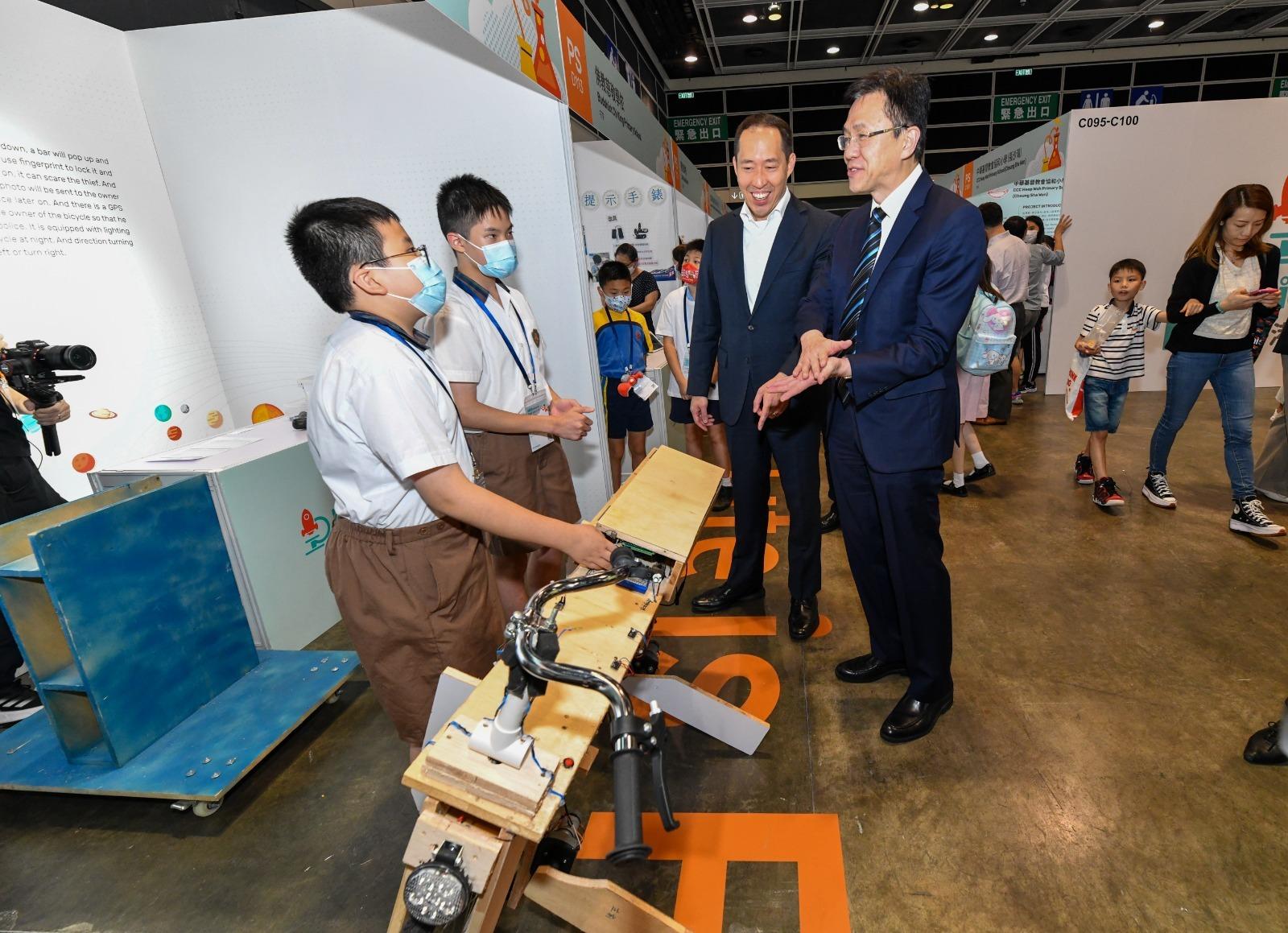 Students and tutors from 120 local and international schools raise a cheer in celebration of their successful participation in the Hong Kong Science Fair 2023, held at the Hong Kong Convention and Exhibition Centre on June 17-18. (EDMOND TANG / CHINA DAILY)
Students and tutors from 120 local and international schools raise a cheer in celebration of their successful participation in the Hong Kong Science Fair 2023, held at the Hong Kong Convention and Exhibition Centre on June 17-18. (EDMOND TANG / CHINA DAILY)
The Hong Kong Innovation Foundation (HKIF) successfully held its second Hong Kong Science Fair on June 17-18, providing a shot in the arm for young innovators amid the city's drive to become a global innovation and technology hub.
Featuring innovative projects of 120 teams from local primary and secondary schools, the two-day event drew more than 20,000 attendees.
At the awards ceremony on June 18, Chief Executive of the Hong Kong Special Administrative Region John Lee Ka-chiu said the HKIF has been promoting the development of innovative technology and actively providing opportunities for Hong Kong's younger generation to learn and practice innovative ideas.
ALSO READ: CE: HK mulls ways to promote cross-boundary inno-tech
"The Hong Kong Science Fair is a great inspiration and encouragement to young people as it allows them to showcase their creative achievements to the public and share how they can tackle the challenges of daily life through innovative technology," he said.
In the work report of the 20th National Congress of the Communist Party of China, it's clearly pointed out that science and technology should continue to constitute the primary productive force of the country, with talent as the primary resource and innovation as the primary driving force.
Positioned as a global innovation and technology center in the 14th Five-Year Plan (2021-25), Hong Kong boasted definite advantages and has spared no efforts in promoting technological development to serve the nation's needs of a high level of tech self-reliance.
 Three gold-award-winning teams pose with their rocket-shaped trophies — C&MA Chui Chak Lam Memorial School (back row in pink uniforms) in the primary division, St. Stephen's Girls' College (back row in blue uniforms) in the junior secondary division, and Bishop Hall Jubilee School (front row) in the senior secondary division. (PHOTO PROVIDED TO CHINA DAILY)
Three gold-award-winning teams pose with their rocket-shaped trophies — C&MA Chui Chak Lam Memorial School (back row in pink uniforms) in the primary division, St. Stephen's Girls' College (back row in blue uniforms) in the junior secondary division, and Bishop Hall Jubilee School (front row) in the senior secondary division. (PHOTO PROVIDED TO CHINA DAILY)
The number of startups in the HKSAR had almost quadrupled to 3,985 in 2022, up from about 1,000 in 2014. More specifically, Hong Kong's scale of fundraising for biotechnology is now the largest in Asia and the second-largest in the world, with 53 pre-revenue or pre-profit healthcare and biotechnology companies listed in the city and raising funds of about HK$116 billion ($14.8 billion) at the end of October 2022.
At the Geneva International Exhibition of Inventions - one of the world's most important exhibitions of inventions - Hong Kong clinched nearly 300 awards this year - 1.5 times the number of awards the city won last year, and five to six times the number of awards it won in 2017.
"This is a testament to the growing potential and strength of Hong Kong's innovation and research and development, which has been recognized internationally," Lee said.
The HKSAR government has been stepping up the promotion of education in science, technology, engineering, arts, and mathematics (STEAM). Measures include curriculum enrichment, enhanced teacher training, and diversified learning activities in primary and secondary schools.
 Hong Kong Chief Executive John Lee Ka-chiu (third from right) poses for a photo with students at Po Leung Kuk Luk Hing Too Primary School and their entry - a mechanical cane that enables users to determine the direction in which they are headed. (PHOTO PROVIDED TO CHINA DAILY)
Hong Kong Chief Executive John Lee Ka-chiu (third from right) poses for a photo with students at Po Leung Kuk Luk Hing Too Primary School and their entry - a mechanical cane that enables users to determine the direction in which they are headed. (PHOTO PROVIDED TO CHINA DAILY)
According to the Innovation and Technology Blueprint released last year, the government's target is that 35 percent of the students funded by the University Grants Committee will be taking up subjects related to science, technology, engineering, arts and mathematics in the next five years.
The Hong Kong Science Fair is a great inspiration and encouragement to young people as it allows them to showcase their creative achievements to the public and share how they can tackle the challenges of daily life through innovative technology.
John Lee Ka-chiu, chief executive of the Hong Kong Special Administrative Region
"Young people in Hong Kong are known for their creativity and global perspectives. The Science Fair provides them with a platform to showcase their innovative ideas to the public," said Daryl Ng Win-kong, chairman of the Hong Kong Innovation Foundation, adding that students' works fully reflect their enthusiasm and dedication to science.
"Innovation and technology are the main driving force for the future development of Hong Kong. With the strong support of the central government and the advocacy of the HKSAR government, I look forward to more young people with potential and passion contributing to the development of science and technology in Hong Kong, and to working together towards Hong Kong's growth as an international innovation and technology center," Ng said.
ALSO READ: HKSAR, mainland ink pact to deepen inno-tech ties
The Hong Kong Science Fair was among a string of mega events marking the Asian hub's return to the global stage following the relaxation of travel restrictions.
David Taji Farouki, president of the Jury at the International Exhibition of Inventions Geneva, who attended the Science Fair for the first time, heaped praise on Hong Kong's potential to foster innovation strength, as well as the creativity of local students.
"Hong Kong's unique combination of being an international financial center and an innovation hub, coupled with the support of the Chinese mainland, gives it a competitive advantage in attracting international innovative talents," he said.
He said the fair provided a platform for creative and passionate young inventors to showcase their inventions and foster students' curiosity about social issues.
"I'm impressed by the creativity of Hong Kong students, and I believe these useful inventions will help stimulate further interest in the development of science and innovation for youths in the city," he added.
 A kid tries out an intelligent recycling sorting device designed by students of Buddhist Lam Bing Yim Memorial School. (PHOTO PROVIDED TO CHINA DAILY)
A kid tries out an intelligent recycling sorting device designed by students of Buddhist Lam Bing Yim Memorial School. (PHOTO PROVIDED TO CHINA DAILY)
The second Hong Kong Science Fair was backed by various organizations, including Cyberport, Hong Kong Science and Technology Parks Corporation, the University of Hong Kong, and MIT Hong Kong Innovation Node.
Growing responsibility
The fair received about 400 project submissions from 1,200 Primary 4 to Secondary 6 students from local and international schools. The submissions centered on four themes - "smart city and smart home", "medical and healthcare", "sustainability", and "life is full of surprise".
The 120 shortlisted projects reflect Hong Kong students' ability to identify societal issues and address them with innovative solutions. These inventions cover areas like disease prevention, environmental protection and energy conservation, highlighting the innovators' empathy for those in need and their concern for the community's well-being.
Ten of the projects were awarded prizes for being outstanding, with a "smart doorman system" and a "box saver" system, while "Plantis" won the gold prize in the Primary, Junior Secondary and Senior Secondary divisions respectively.
Invented by C&MA Chui Chak Lam Memorial School, the "smart doorman system" adopted face recognition technologies to help dementia patients recognize their family members and friends, protecting them and their loved ones from intruders.
ALSO READ: CE vows to enhance city’s inno-tech ecosystem
The intelligent gatekeeper is able to record the facial identity of an elderly person's relatives and friends and display their relationship with the user, group member Chung Pui-ching explained.
If an unrecognized stranger appears, the system will issue an alert to remind the elderly person to be vigilant. At the same time, the system will send a message to the user's friends and relatives through the cloud, informing them that a stranger has visited, so they can follow up promptly and, to the greatest extent possible, safeguard the elderly person's life and property.
The "box saver" system, invented by St. Stephen's Girls' College, chimes well with the global sustainable development drive.
Spotting the sore point of overpacking, the mixing of recyclable and nonrecyclable materials, as well as excessive use of adhesive tape, the team makes use of reusable packaging boxes with an effective collection system to help customers cut their delivery costs without compromising on the protection of delivered items.
Under a "reuse rather than recycle" policy, the "box saver" could also benefit companies by improving their corporate image through such a green-friendly policy step.
 Secretary for Innovation, Technology and Industry Sun Dong (right) and Hong Kong Innovation Foundation Chairman Daryl Ng Win-kong are briefed by students of the Ho Ming Primary School (Sponsored by Sik Sik Yuen) on their ideas behind a learner-friendly bicycle that prevents falls or theft.
(PHOTO PROVIDED TO CHINA DAILY)
Secretary for Innovation, Technology and Industry Sun Dong (right) and Hong Kong Innovation Foundation Chairman Daryl Ng Win-kong are briefed by students of the Ho Ming Primary School (Sponsored by Sik Sik Yuen) on their ideas behind a learner-friendly bicycle that prevents falls or theft.
(PHOTO PROVIDED TO CHINA DAILY)
Student Ko Ching-yan said the reusable packaging box can be reused about 20 times, and the related materials can be recycled, making it more environmentally friendly than traditional packaging.
"Plantis", invented by students from Bishop Hall Jubilee School, is a floating greenhouse that operates in the sea to produce fresh water for planting, thereby ensuring sufficient crop production.
Team member Simeon Suen Wan-to said the project's idea is to solve the world's growing food crisis due to global warming, extreme weather conditions, rising water levels and increasing food demand.
Citing Hong Kong's insufficient farmland, which is less than 3 percent of its total land and sea area, Suen said the team would try to introduce shrimp and other animals to create a more-suitable environment for growing vegetables with the concept of "aquaponics".
"We hope to cooperate with the government in improving the idea and implementing it on a large scale and, at the same time, driving the development of Hong Kong's innovation and technology industry," he added.
A smart device with artificial intelligence face detection for protecting Chinese white dolphins from being hit, designed by Pui Shing Catholic Secondary School, clinched the "Most Popular Award" through on-site voting by visitors to the fair.
The fair also featured interactive zones for parent-child engagement, offering families an opportunity to enjoy technology-related activities.
Invited guests from different organizations also shared their insights on the applications of innovative technology in everyday life and its development in the international market, promoting dialogue and collaboration among technology companies, academia and the public.


